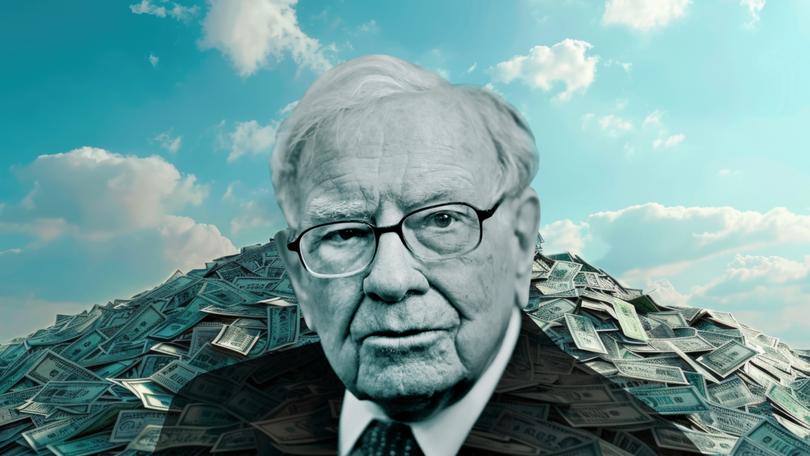THE ECONOMIST: Warren Buffett’s retirement creates a $US348 billion question for his successor
Berkshire Hathaway’s next CEO has huge shoes to fill — and a mountain of cash to invest.

Surprising people at the age of 94 is no mean feat. Warren Buffett has retained that capacity. As Berkshire Hathaway’s annual shareholder meeting on May 3 drew to a close, Mr Buffett announced that he would be stepping down as CEO of the sprawling conglomerate.
The move will come at the end of the year, after six decades in charge. Mr Buffett had been preparing for his own departure. But he said he did not give most of Berkshire’s directors advance notice of his announcement. Nor did he tell Greg Abel, his presumptive successor.
Berkshire Hathaway was a textile manufacturer when Mr Buffett bought the company in 1965. In the years that followed he turned it into an immense insurance firm and a conglomerate with interests in everything from energy to candy.
Sign up to The Nightly's newsletters.
Get the first look at the digital newspaper, curated daily stories and breaking headlines delivered to your inbox.
By continuing you agree to our Terms and Privacy Policy.He deployed a value-investing strategy — seeking out companies which appeared to be cheap relative to their intrinsic value. Between 1965 and the end of last year, Berkshire’s market value had risen by more than 5,500,000 per cent, with a compounded annual return of almost 20 per cent. The total return of the S&P 500 index over that period was 39,000 per cent.
Today Berkshire has a market capitalisation of $US1.16 trillion ($180trn). Still, Mr Buffett has left his successor with a difficult task. Mr Abel has been with the company for a quarter of a century. He has run its non-insurance operations — such as its energy, railway and retail businesses — since 2018. The challenge goes beyond filling Mr Buffett’s shoes as an investing “oracle”. Berkshire’s investment strategy is becoming harder to pull off.
Over the past year Mr Buffett has aggressively sold stocks, including a large chunk of his stake in Apple, a tech giant. Now, for the first time in two decades, Berkshire owns more cash than it does listed equities. At the end of March it had $US348b in cash and short-term American government debt on its balance-sheet, more than twice the amount it reported at the close of 2023.
Its holdings of Treasury bills account for about 5 per cent of the outstanding market. If Berkshire were a foreign country, it would be the tenth-largest holder of American government debt, bigger than India, Switzerland or Taiwan.
Mr Buffett’s decision to withdraw from the stock market has so far benefited Berkshire. The firm’s stock is up by 20 per cent this year, while the S&P 500 is down by 3 per cent. Now Mr Buffett and Mr Abel need to figure out what to do with their enormous pile of cash.
There are worse problems to have, but Berkshire’s position reflects a tough environment for the sort of investing that made Mr Buffett famous. Lately he has griped that there is not much out there to buy at a reasonable price. Even after the recent market tumult, valuations of listed companies are high relative to their historical levels.
One option for Mr Abel would be to expand more aggressively into overseas investments. In recent years Mr Buffett made successful bets abroad. For example, he poured billions of dollars into several of Japan’s trading conglomerates, such as Mitsubishi and Sumitomo. Mr Abel might note that among companies worth over $US5b and with price-to-earnings ratios below ten — suggesting they are cheaply valued — 80 per cent by value are domiciled outside America.
Another option would be to stray from value investing in the hope of finding more firms to pour money into. That seems unlikely, at least for now. Such a move would transform Berkshire’s culture and risk the ire of Mr Buffett’s army of admirers. After 25 years at the firm, Mr Abel is unlikely to pull a handbrake turn straight away.
Absent a change on either front, Berkshire will have to wait for a downturn in the market to find big new opportunities to use its cash pile. Mr Buffett had a history of spotting such prospects. He snapped up a large stake in Wells Fargo, an American bank, during a slump in 1990. He invested in companies such as Johnson & Johnson and Kraft Foods (and Wells Fargo again) in the aftermath of the 2007-09 global financial crisis. The list goes on. Berkshire’s shareholders must hope Mr Abel has the same oracular vision.
